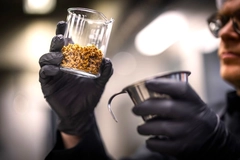
- Industry news
Industry news
- Category news
Category news
- Reports
- Key trends
- Multimedia
- Journal
- Events
- Suppliers
- Home
- Industry news
Industry news
- Category news
Category news
- Reports
- Key trends
- Multimedia
- Events
- Suppliers
Nestlé and the Mexican Government Work Together to Support Coffee and Cocoa Productivity in Mexico

Mexican Minister of Agriculture, Francisco Javier Mayorga Castañeda has visited Nestlé's Research and Development Center in Tours, France. Nestlé is developing mass propagation methods through somatic embryogenesis, ensuring coffee and cocoa genetic characteristics and quality.

8 Feb 2010 --- Nestlé has welcomed the Mexican Minister of Agriculture, Livestock, Rural Development, Fishing and Food (SAGARPA), Francisco Javier Mayorga Castañeda; the Director of the National Forestry Agriculture and Livestock Research Institute (INIFAP), Pedro Brajcich Gallegos; and the Nestlé Mexico Vice-President of Coffees and Beverages, Mario Vera at its Research and Development Center in Tours (France). The purpose of the visit was to show the visitors the coffee and cocoa propagation techniques that are currently being implemented with Mexican producers and farmers. These techniques help increase productivity.
In line with the Creating Shared Value philosophy - Nestlé's way of doing business - Nestlé provides technology, technical support and social programs to its coffee, milk and cocoa producers in Mexico. These initiatives help farmers to achieve higher quality crops and thus obtain higher income and higher living standards. Every year, Nestlé invests more than 7 million pesos (USD 540 thousand) in its coffee and cocoa sustainable development projects in Mexico.
Since 1993 Nestlé México has collaborated with the National Forestry Agriculture and Livestock Research Institute (INIFAP) in several coffee, cocoa and milk-related research and technology transfer projects. It started sponsoring PhD courses for the INIFAP´s staff at Nestlé's Research and Development Center in Tours (France) on the development of protocols for new vegetative propagation techniques through the in vitro cultivation of tissues, called "somatic embryogenesis".
The INIFAP has been working with Nestlé on coffee and cocoa genetic improvement programmes for 16 years. The purpose of these programs is to develop plants with improved productivity characteristics, higher disease resistance and higher quality that will increase farmers' competitiveness and income.
Around 3 million improved coffee plants have been cultivated from 2002 to 2009, and currently producers in the states of Chiapas, Oaxaca, Puebla and Veracruz are benefiting from these programs. Nestlé and the Mexican Government will work together to expand these programs to other states including Tabasco and Guerrero.
By investing in research and development to benefit coffee and cocoa producers, as well as by improving Mexican consumers' nutrition, health and wellness through its products and community programmes, Nestlé is strengthening its commitment to Mexico. Over the next three years Nestlé will invest 5 thousand million pesos (USD 390 million) in the country.












